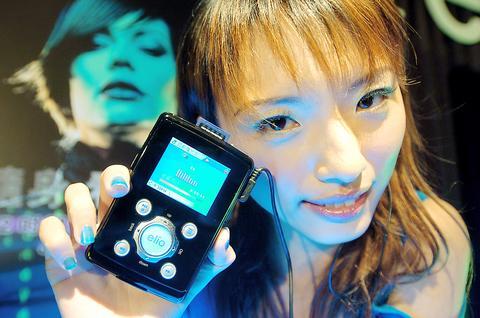Tatung Co (
The "elio" brand is also expected to build a new image for the 85-year-old company as part of its efforts to appeal to younger generations, the major consumption force for portable electronics products.
"Young people recognize the Tatung brand, but may not identify with it," said Alan Pan (

PHOTO: GEORGE TSORNG, TAIPEI TIMES
"Therefore, we would like to demarcate our products by launching different product lines. This is also a global trend," he said.
The event yesterday showcased the first product to be released under the new brand name, the Photo Jukebox, an MP3 player that can display photos stored from digital cameras.
The 178-gram unit is installed with a 2.2-inch diagonal colored screen and has a capacity of 20 gigabytes, capable of storing up to 5,000 songs or 7,000 photos.
The company targets women, commuters, sports lovers and people aged between 18 and 35 as the potential customers for Photo Jukebox, which is priced at NT$14,500, Pan said.
Tatung one of a number of electronics vendors that launched new MP3 players recently by targeting affluent young consumers in the peak summer season.
BenQ Corp (
A market watcher said that Tatung's branding strategy may not create the effect it expects.
"People's brand loyalty in consumer products is weak. Their choices will change quickly when lower prices are offered and new functions are unveiled," said Helen Chen (
She said the launch of a new product line is merely a marketing strategy and that the effect it is likely to achieve will be smaller than the company hopes, as the market is already inundated with numerous brand names.
Tatung's new product will also hit the shelves in China, the US and Europe early next month but will be marketed under the brand names of their cooperating partners, which Pan said can help the company make inroads into overseas markets.
Tatung plans to roll out 150,000 Photo Jukebox units this year and hopes to sell between 500,000 and 600,000 units next year, according to Pan.
By launching versatile products packaged in fashionable designs, Pan said that Tatung wants to break away from price wars and become a leading manufacturer of portable digital devices.

On Tuesday, US President Donald Trump weighed in on a pressing national issue: The rebranding of a restaurant chain. Last week, Cracker Barrel, a Tennessee company whose nationwide locations lean heavily on a cozy, old-timey aesthetic — “rocking chairs on the porch, a warm fire in the hearth, peg games on the table” — announced it was updating its logo. Uncle Herschel, the man who once appeared next to the letters with a barrel, was gone. It sparked ire on the right, with Donald Trump Jr leading a charge against the rebranding: “WTF is wrong with Cracker Barrel?!” Later, Trump Sr weighed

Taiwan Semiconductor Manufacturing Co (TSMC, 台積電) secured a record 70.2 percent share of the global foundry business in the second quarter, up from 67.6 percent the previous quarter, and continued widening its lead over second-placed Samsung Electronics Co, TrendForce Corp (集邦科技) said on Monday. TSMC posted US$30.24 billion in sales in the April-to-June period, up 18.5 percent from the previous quarter, driven by major smartphone customers entering their ramp-up cycle and robust demand for artificial intelligence chips, laptops and PCs, which boosted wafer shipments and average selling prices, TrendForce said in a report. Samsung’s sales also grew in the second quarter, up

HEADWINDS: Upfront investment is unavoidable in the merger, but cost savings would materialize over time, TS Financial Holding Co president Welch Lin said TS Financial Holding Co (台新新光金控) said it would take about two years before the benefits of its merger with Shin Kong Financial Holding Co (新光金控) become evident, as the group prioritizes the consolidation of its major subsidiaries. “The group’s priority is to complete the consolidation of different subsidiaries,” Welch Lin (林維俊), president of the nation’s fourth-largest financial conglomerate by assets, told reporters during its first earnings briefing since the merger took effect on July 24. The asset management units are scheduled to merge in November, followed by life insurance in January next year and securities operations in April, Lin said. Banking integration,

LOOPHOLES: The move is to end a break that was aiding foreign producers without any similar benefit for US manufacturers, the US Department of Commerce said US President Donald Trump’s administration would make it harder for Samsung Electronics Co and SK Hynix Inc to ship critical equipment to their chipmaking operations in China, dealing a potential blow to the companies’ production in the world’s largest semiconductor market. The US Department of Commerce in a notice published on Friday said that it was revoking waivers for Samsung and SK Hynix to use US technologies in their Chinese operations. The companies had been operating in China under regulations that allow them to import chipmaking equipment without applying for a new license each time. The move would revise what is known